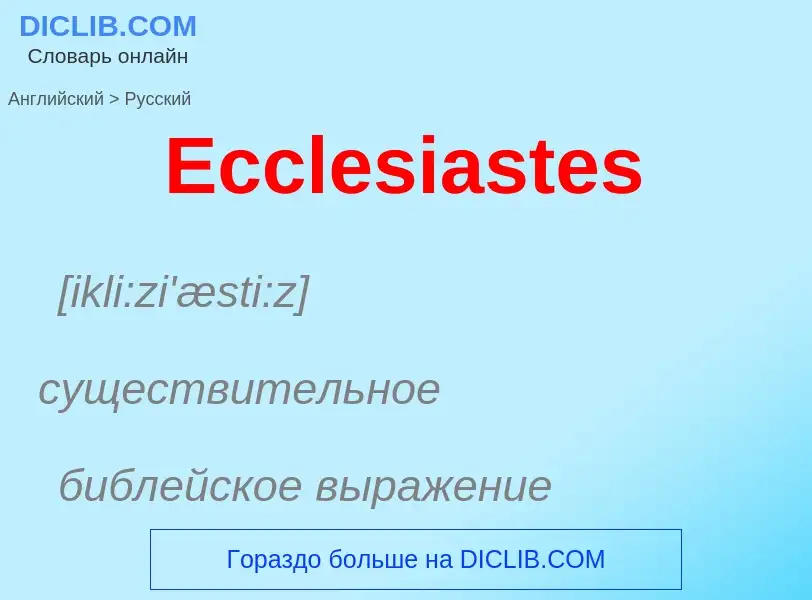Traducción y análisis de palabras por inteligencia artificial ChatGPT
En esta página puede obtener un análisis detallado de una palabra o frase, producido utilizando la mejor tecnología de inteligencia artificial hasta la fecha:
- cómo se usa la palabra
- frecuencia de uso
- se utiliza con más frecuencia en el habla oral o escrita
- opciones de traducción
- ejemplos de uso (varias frases con traducción)
- etimología
Ecclesiastes - traducción al ruso
[ikli:zi'æsti:z]
существительное
библейское выражение
Екклезиаст
Definición
Wikipedia

Ecclesiastes (; Biblical Hebrew: קֹהֶלֶת, romanized: Qōheleṯ, Ancient Greek: Ἐκκλησιαστής, romanized: Ekklēsiastēs) is one of the Ketuvim ("Writings") of the Hebrew Bible and part of the Wisdom literature of the Christian Old Testament. The title commonly used in English is a Latin transliteration of the Greek translation of the Hebrew word קֹהֶלֶת (Kohelet, Koheleth, Qoheleth or Qohelet). An unnamed author introduces "The words of Kohelet, son of David, king in Jerusalem" (1:1) and does not use his own voice again until the final verses (12:9–14), where he gives his own thoughts and summarises the statements of Kohelet; the main body of the text is ascribed to Kohelet himself.
Kohelet proclaims (1:2) "Vanity of vanities! All is futile!"; the Hebrew word hevel, "vapor", can figuratively mean "insubstantial", "vain", "futile", or "meaningless". Given this, the next verse presents the basic existential question with which the rest of the book is concerned: "What profit hath a man for all his toil, in which he toils under the sun?", expressing that the lives of both wise and foolish people all end in death. While Kohelet endorses wisdom as a means for a well-lived earthly life, he is unable to ascribe eternal meaning to it. In light of this perceived meaninglessness, he suggests that human beings should enjoy the simple pleasures of daily life, such as eating, drinking, and taking enjoyment in one's work, which are gifts from the hand of God. The book concludes with the injunction to "Fear God and keep his commandments; for that is the duty of all of mankind. Since every deed will God bring to judgment, for every hidden act, be it good or evil."
According to rabbinic tradition the book was written by King Solomon in his old age, but the presence of Persian loanwords and Aramaisms point to a date no earlier than about 450 BCE, while the latest possible date for its composition is 180 BCE.


![King Solomon]] in Old Age'' by [[Gustave Doré]] (1866); a depiction of the purported author of Ecclesiastes, according to rabbinic tradition. King Solomon]] in Old Age'' by [[Gustave Doré]] (1866); a depiction of the purported author of Ecclesiastes, according to rabbinic tradition.](https://commons.wikimedia.org/wiki/Special:FilePath/087.King Solomon in Old Age.jpg?width=200)
